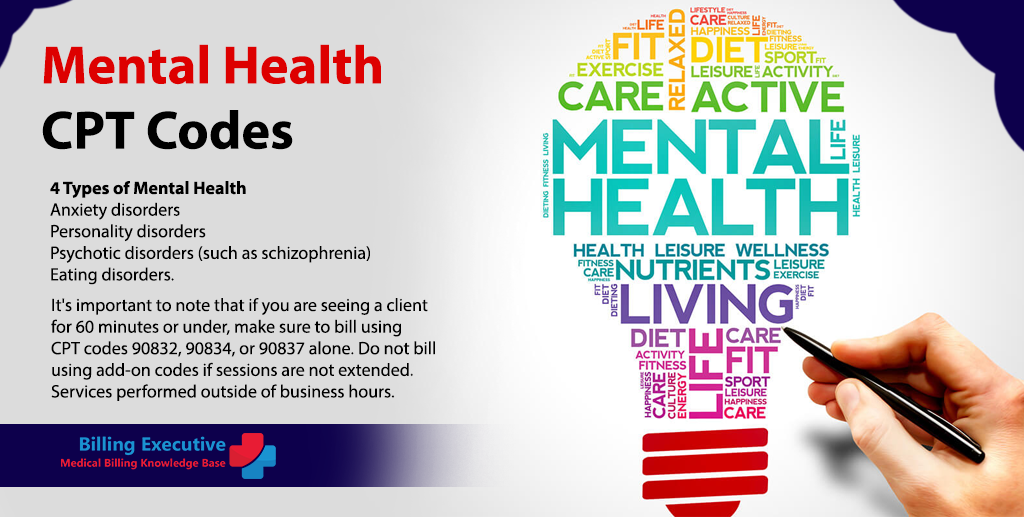Accuracy in using CPT codes may not appear to be of the utmost priority but utilizing the proper CPT codes for the health services you offer is essential. When your claims include the correct codes, they will be processed more quickly and providing the cash flow you need to run your practice. Coding errors result in your procedure being audited and result in fines. This post will go over how to use CPT codes and the most frequent codes you should be aware of.

Mental Health CPT Codes
The Current Procedural Terminology (CPT) code set defines medical checks, examinations, medications, and other operations used across the healthcare sector. The American Medical Association publishes and updates the collection, which comprises over 8,000 codes, yearly. It was designed to detect healthcare patterns and issues for use in the claims filing process. The codes inform payers about the procedures you must be reimbursed as a provider.
The mental health codes (90785-90899) are discovered in the Psychiatry section of the CPT code set and encompass services provided by the medical professionals such as psychiatrists and services that can be delivered by non-medical professionals such as licensed clinical psychologists, licensed clinical social workers, and licensed clinical social workers.
Categories of Mental Health CPT Codes
The mental health CPT codes are divided into four main distinct categories.
Family Medical Psychotherapy
Code 90846 is used for family psychotherapy without patient presence.
Code 90847 is used for family psychotherapy with patient presence.
Code 90849 is used for multiple-family group psychotherapy
Group Psychotherapy
Code 90853 is used for Group psychotherapy.
Code 90857 is used for Interactive group psychotherapy.
Psychiatric Diagnostic Interview
Code 90801 and Code 90802 are used for Psychiatric Diagnostic Interview.
Psychiatric Therapeutic Services
Codes 90804-90809 are used for supportive psychotherapy, and 90810-90815 are used for Interactive psychotherapy.
CPT Codes for Common Mental Health
Numerous codes may be relevant to mental health services in general, but a limited portion of these codes are used in a therapy setting. Knowing the most popular CPT codes for mental health can assist you in selecting the correct code for each service you perform. Here are the most common codes you’ll come across as a therapist.
90837 — 60-minute psychotherapy with the client or a family member.
90834 — 45-minute psychotherapy with the client or a family member.
90791 — Psychiatric diagnostic examination without medical services
90792— For an initial assessment with medical assistance.
90847 — 50-minute family psychotherapy.
90853 — Group psychotherapy
90846 – 50-minute family psychotherapy session.
90875 — 20-30 minutes under other psychiatric procedures
90832 – 30 minutes of psychotherapy
90838 – 60-minute psychotherapy with E/M service
99404 — Individual counseling services are classified as preventative medicine
CPT Code Modifiers
Code modifiers provide a payer with additional information. Modifiers characterize the provider’s licensing level, when services were delivered, and how the services were offered. Here are four modifiers you could come into.
Modifier 25 — In most cases, a single code is sufficient to define a session adequately. A completely independent E/M service may be required on the same day. Modifier 25 is utilized in these cases because it distinguishes the service as distinct and reimbursable. Modifier 25 may only be applied to codes 99201-99215 and 99341-99350.
Modifier 59 — Like modifier 25, this modifier describes a unique non-E/M procedural service performed on the same day.
GT Modifier – Used in telehealth sessions with interactive audio and video.
UT Modifier— Used when a clinician meets a patient with difficulty.
A Healthier Practice Comes From More Accurate Coding
When you realize how CPT codes operate and are familiar with the codes, you’ll use them most frequently in your therapy practice. You will enhance your claims submission rate and lower your chances of getting reported for incorrect coding. Aside from the obvious benefit of increased cash flow, precise coding provides peace of mind because you won’t have to worry about whether you’re utilizing CPT codes appropriately.
About us
Billing Executive – a Medical Billing and Coding Knowledge Base for Physicians, Office staff, Medical Billers and Coders, including resources pertaining to HCPCS Codes, CPT Codes, ICD-10 billing codes, Modifiers, POS Codes, Revenue Codes, Billing Errors, Denials and Rejections.
We have more than 10 years experience in US Medical Billing and hand-on experience in Web Management, SEO, Content Marketing & Business Development with Research as a special forte.
Learn More
Understanding & Navigating Your Insurance Policy
Developments in Medical Billing And Coding in 2022
Friday Health Plans and Levels, Which is Right for You?
Coping up with Cybersecurity Risks in Healthcare Industry
